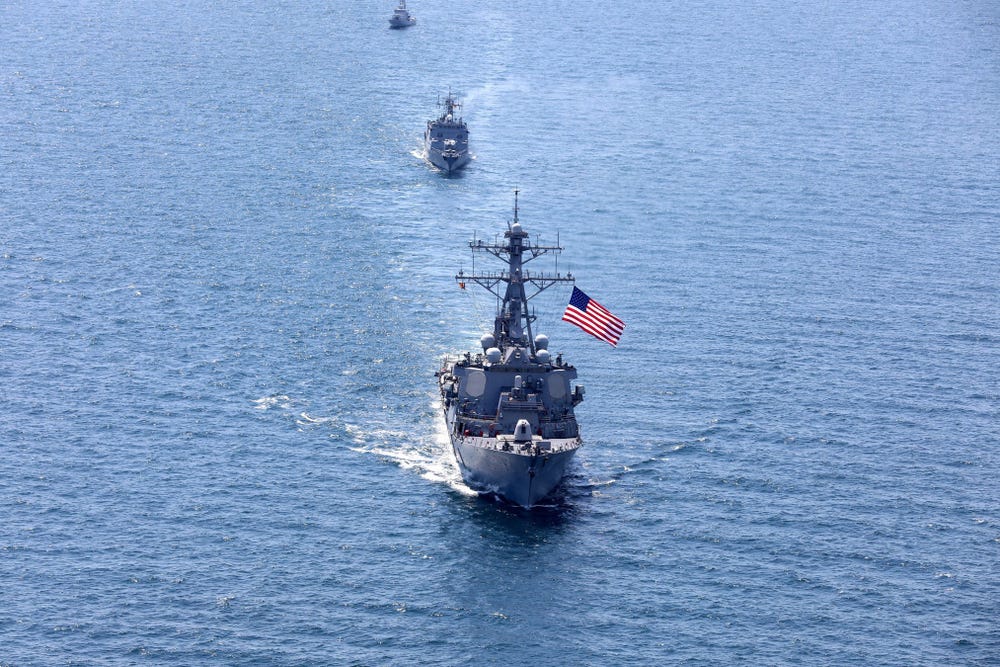AKP’s strategists claim in a multipolar world, a growing power like Turkey’s can’t bound to one bloc, thus justifying “a policy of diplomatic independence”. While this view may have some merit, it needs a solid set of principals at its core, which Turkey lacks, meaning diplomatic independence is nothing more than crass transnationalism. Moreover given Turkey’s geography adjacent to Russia and Iran, two expansionist nations, she can’t stay out of the fray, when US and the Western bloc pushes back. The latest example of this strategic inconsistency is the Ukraine crisis. Turkey, a strategic partner of Russia, allowed –as per Montreux Treaty—US warships to sail to Black Sea.
The US will send two warships to the Black Sea next week, Turkey said on Friday, as Russia, which has beefed up its military forces near Ukraine, accused non-coastal NATO powers of increasing naval activity in the region, reports Business Insider through Reuters.
Washington says Russia has amassed more troops on Ukraine’s eastern border than at any time since 2014, when it annexed Crimea from Ukraine and backed pro-Russian separatists in the eastern Donbass region of Ukraine.
Violence has flared between Ukrainian troops and the separatists, spurring fears of a major escalation. Russian President Vladimir Putin accused Ukraine on Friday of “dangerous provocative actions” in the Donbass region during a telephone conversation with Turkey’s President Tayyip Erdogan.
WATCH: Clash of Civilizations Reformatting World Economy
Turkey, a NATO ally, said on Friday the United States would deploy two warships to the Black Sea from April 14-15.
“A notice was sent to us 15 days ago via diplomatic channels that two US warships would pass to the Black Sea, in line with the Montreux Convention. The ships will remain in the Black Sea until May 4,” Turkey’s foreign ministry said.
The 1936 Montreux accord gives Turkey control over the Bosporus and Dardanelles straits, which connect the Mediterranean to the Black Sea. It also limits access of naval warships and governs foreign cargo ships.
WATCH: Real Turkey feat Bahadir Kaleagasi: Turkey and Russia in Biden Era
NATO activity
The Black Sea region is seen as a focal point for competition between NATO members and Russia. NATO forces have increased their presence there amid heightened tensions, and there are frequent encounters between ships and aircraft from both sides.
Russian Deputy Foreign Minister Alexander Grushko raised concerns on Friday over what he said was increasing Black Sea naval activity by powers that did not have a coastline in the region, an apparent reference to the US.
“The number of visits by NATO countries and the length of the stay of (their) warships have increased,” he was quoted as saying by the Interfax news agency.
In recent days, Russian warships in the Black Sea have conducted “artillery firings” at land and sea targets, and Russia’s Defense Ministry said Thursday that it was moving more than 10 navy vessels — including landing boats and artillery warships — from the Caspian Sea to the Black Sea for exercises.
According to a Reuters witness who keeps track of ships passing through Turkey’s Bosporus strait, the US and NATO increased their presence in the Black Sea early this year, when President Joe Biden’s administration took power.
The Reuters witness said the level had reached that seen in 2014-2015 at the time of the Crimea annexation.
Ukraine’s President Volodymyr Zelensky is currently meeting Erdogan in Turkey on Saturday on a previously scheduled visit.
Bloomberg had reported that in retaliation of the Zelensky visit, Kremlin leaked word that it may ban its tourists from Turkish destinations. Its spokespersons also spoke out against Canal Istanbul, stating that whether it is built or not, Russia considers the Treaty of Montreux as the bedrock of political stability in Black Sea.
Since the Treaty of Montreux guarantees almost fee-free passage of cargo vessels through the Turkish straits, adhering to it significantly reduces the traffic potential of the Canal Istanbul, where construction will presumably start this summer.
Follow our English language YouTube videos @ REAL TURKEY: https://www.youtube.com/channel/UCKpFJB4GFiNkhmpVZQ_d9Rg
And content at Twitter: @AtillaEng
Facebook: Real Turkey Channel: https://www.facebook.com/realturkeychannel/
